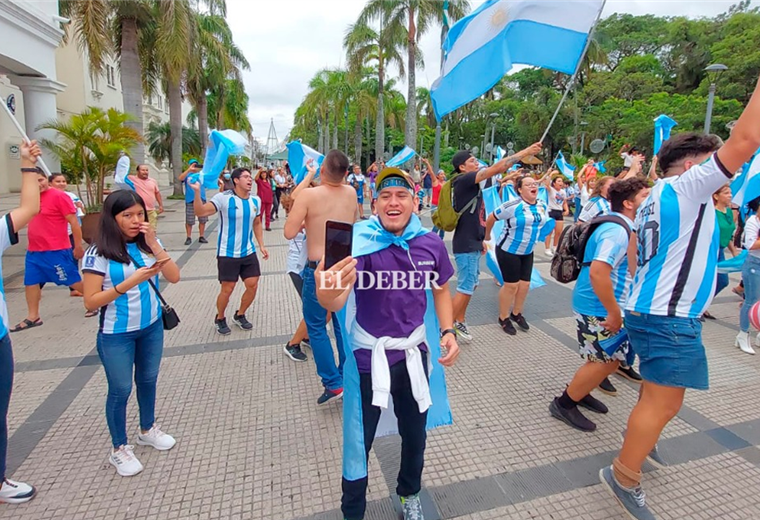Winning the last Copa America, in Brazil, ending a 28-year drought without official titles, returned to Argentina the pleasure of celebrating. The victory over Italy in the Final, a duel between the South American and European champions, showed that the brothers wanted more. They wanted the world. And he came, after 36 years of waiting and two painful runners-up (1990 and 2014). This Sunday (18), the Albiceleste team defeated France 4-2 in the penalty shootout, after a 3-3 draw with the ball rolling, at the Lusail Stadium, in the decision of the Qatar Cup, ensuring the third world championship.
Argentina win the World Cup on penalties! ?? @adidasfootball ?? #FIFAWorldCup
— FIFA World Cup (@FIFAWorldCup) December 18, 2022
Champion at home, in 1978, and in Mexico, eight years later, Argentina lifted the world cup for the first time away from the American continent. In 22 editions, this is the third time that the feat has happened. The previous ones were in 1958 (Sweden) with Brazil and in 2014 (Brazil) with Germany.
As in 1986, the Argentine title has a prominent protagonist. If back then the guy was Diego Armando Maradona, this time it would have to be Lionel Messi. As fate would have it, the 35-year-old star, in the last Cup of his career, could finally lift the most coveted cup on the planet. More than that, being the maestro of a team that played, of course, for the country, but also for the number 10 shirt. In addition to being champion, Messi ended the competition as vice-scorer (with seven goals) and player with the most appearances in the history of the World Cups (26, ahead of German Lothar Matthäus).
The title crowns a campaign that, in the first round, seemed unlikely. Despite being favorites, Argentina debuted defeated by Saudi Arabia, by 2 to 1, on the comeback. The stumbling block ended a 36-game unbeaten streak. The recovery began with the 2-0 victory over Mexico. The victory over Poland, by the same score, gave the brothers the leadership of Group C. In the round of 16 and in the quarterfinals, classifications suffered against Australia (2 to 1) and Netherlands (on penalties, after a 2 to 2 tie in regular time). In the semifinal, the great performance of the team, in the 3 to 0 applied in Croatia.
The French, current champions at the time, felt the bitter taste of vice for the second time – the first was in 2006. They lost the chance to repeat the Brazil of Pelé and Garrincha, the last team to win two World Cups in a row, between 1958 and 1962. The youth from the Les Bleus squad, full of names under the age of 30 (21 of the 25 called up), including the star Kylian Mbappé, shows, however, that the Europeans will remain strong towards the next World Cup, in 2026 (United States, Canada and Mexico) . The number 10, by the way, scored three goals in the final and ended the competition in Qatar as top scorer, with eight goals, reaching 12 in the history of the tournament, but it ended up not being enough.
??#FIFAWorldCup ?? #Qatar2022 pic.twitter.com/fUgLdqnYxU
— FIFA World Cup (@FIFAWorldCup) December 18, 2022
In France, Didier Deschamps sent a formation to the field with no surprises, with defender Dayot Upamecano and defensive midfielder Adrien Rabiot returning from the flu, compared to the team that beat Morocco 2-0 in the semifinal. On the Argentine side, the expectation was that Lionel Scaloni would climb a team with three defenders, to hold Mbappé. The coach, however, not only repeated the lineup of four defenders in the victory over Croatia, but also replaced midfielder Leandro Paredes with striker Ángel Di Maria.
Scaloni’s option proved to be the right one. It was precisely with Di Maria, open on the left, tormenting full-back Jules Koundé, that Argentina took over the first half. In the seventh minute, the striker rolled over to midfielder Rodrigo De Paul to drop the bomb at the entrance to the area. The ball deflected off defender Raphael Varane and nearly stunned goalkeeper Hugo Lloris. In the 16th minute, after resuming the ball in the middle and playing with Messi on the right, De Paul reached the bottom line and crossed low for Di Maria to hit, over the goal.
The Argentine superiority was consolidated after 20 minutes, again with Di Maria. The number 11 invaded the area on the left and was brought down by fellow striker Ousmane Dembelé. Messi, from the penalty spot, displaced Lloris and opened the scoring. At 35 minutes, midfielder Alexis Mac Allister launched a counterattack with Messi, who found Júlian Álvarez on the right. The attacker launched Mac Allister, who entered the area and rolled to the left for Di Maria, as the French goalkeeper left, expanding the South American advantage and getting emotional in the celebration.
— FIFA World Cup (@FIFAWorldCup) December 18, 2022
After 40 minutes, France had practically not gone beyond the midfield, leading Deschamps to change the team twice, still in the first half: Ousmane Dembelé and Olivier Giroud gave way to the also attackers Marcus Thuram and Randal Kolo Muani, the same ones who entered in the game against Morocco and helped the team to qualify for the final. Even so, Les Bleus went into the break without a single finish, not even outside.
On the way back to the second half, the Argentines remained in the offensive field, cornering the French. At 13 minutes, Álvarez received from Di Maria in the area, on the left, but the shot, without an angle, was saved by Lloris, in the right corner. On the next shot, Di Maria, once again, passed as he wanted by Koundé in the area and crossed low. The ball passed by De Paul, but not by Messi, who dribbled past Thuram, but was stopped by Rabiot at the right time, already in the small area.
Only in the 22nd minute of the final stage did France finally manage to finish, after 74 minutes of ball rolling (considering first-half stoppage time), with a header off Kolo Muani. At 25 minutes, it was Mbappé’s turn to find a gap to take the first shot of the match, over the top. Still little, of course, but a sign that the French were alive in the match.
So alive that, in two minutes, they sought an unbelievable equalizer. At 34 minutes, when the Argentine fans were already singing olé in the stands, Kolo Muani shot from the left, entered the area and was tackled by defender Nicolás Otamendi. Clear penalty, which Mbappé converted, dropping the bomb in the right corner of goalkeeper Emiliano Martínez. In the 36th minute, striker Kingsley Coman disarmed Messi on the right, turned the ball to the left side, Thuram fixed it and Mbappé hit a beautiful first shot, from the edge of the area. Everything is the same in Lusail.
⚽️ 80′
⚽️ 81′An incredible turnaround! ?? pic.twitter.com/gkc3QboYCo
— FIFA World Cup (@FIFAWorldCup) December 18, 2022
In shock and already without Di Maria (who gave way to full-back Marcos Acuña) Argentina suffered the blitz of a lit France, largely thanks to the arrivals of Coman and Eduardo Camavinga. In extra time, at 47 minutes, the defensive midfielder (who replaced Théo Hernández) disarmed De Paul on the left and launched Mbappé, who crossed, from outside the area, with a deflection, over the top. Then, after Thuram’s move on top of Otamendi on the left and Camavinga’s pass into the area, Rabiot kicked low, free, to Martínez’s good save, in two halves. Three minutes later, finally, the brothers’ response in Messi’s submission, from the half-moon, which Lloris defended with the wrong hand.
The duel went into overtime, with France more physically fit than Argentina. Not that this, at some point, was an obstacle for the brothers, who managed to reorganize themselves. If the first extra time was of few emotions, the second had plenty. In the third minute, midfielder Enzo Fernández launched striker Lautaro Martínez (who had just entered), who entered the area from the right and hit. Lloris defended, but Messi, in spare, sent it to the nets.
— FIFA World Cup (@FIFAWorldCup) December 18, 2022
The South American celebration, however, was short-lived. At ten minutes, Mbappé kicked from the edge of the area, on the right, and the ball exploded in the arm of lateral Gonzalo Montiel (who was inside the area). Another penalty in favor of the French and another goal by the number 10 of Les Bleus, his third in the final, repeating the feat of the Englishman Geoff Hurst, in 1966, the last to score three goals in a decision. The only thing that didn’t turn around was in the 17th minute, already in stoppage time, because Martínez performed a miracle with a shot by Kolo Muani.
The cup decision, as in 1994 and 2006, would be on penalties. Stars of the final, Mbappé and Messi opened the series converting the respective charges. In the second round of shots, Martínez jumped into the right corner to save Coman’s shot and striker Paulo Dybala, who entered in the second stage of extra time, put the Argentines ahead.
The pressure on the French increased when defensive midfielder Aurelie Tchouaméni, trying to take the ball out of Martínez’s reach, exaggerated the penalty and sent it to the right, out. Paredes, in the sequence, increased the advantage of the brothers. In the fourth round, Kolo Muani dropped the bomb in the middle of the goal to keep the Europeans alive, but it was up to Montiel (the same one who committed the penalty in extra time) to score the title goal.
ARGENTINA ARE WORLD CHAMPIONS!! ??#FIFAWorldCup ?? #Qatar2022
— FIFA World Cup (@FIFAWorldCup) December 18, 2022
Argentina three-time world champion. Somewhere in the sky, Maradona smiles.
* Article updated with more information at 3:12 pm.









